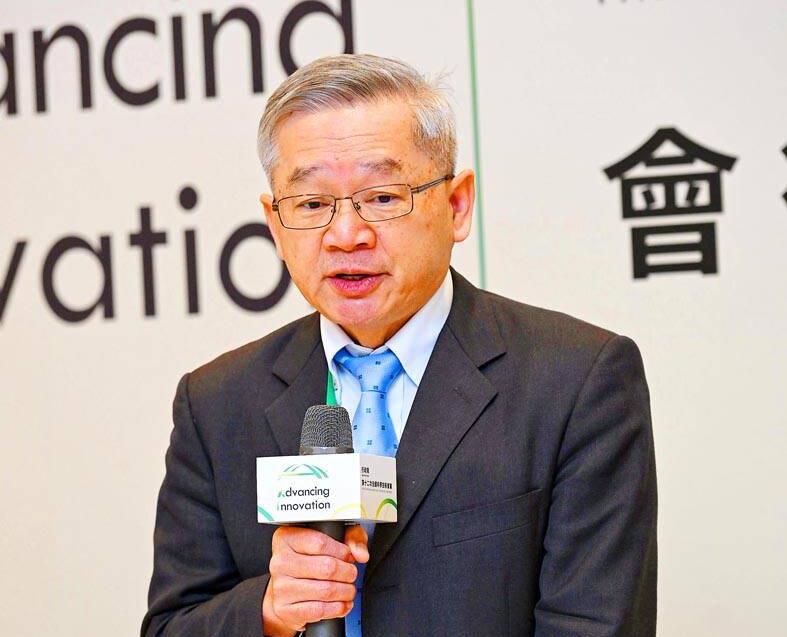Taiwan is launching the “Chip Team Taiwan” initiative to forge robotics, drones and space industry supply chains to decrease dependence on China, National Science and Technology Council Minister Wu Cheng-wen (吳誠文) said yesterday.
Wu made the remarks at a news conference marking the conclusion of the 12th quadrennial National Science and Technology Conference in Taipei.
The integration of semiconductor manufacturing would boost the indigenous tech and defense sector’s growth, he said.

Photo: Chang Chia-ming, Taipei Times
Taiwan has achieved a lot in terms of manufacturing of chips, but lacks the innovation necessary for sustaining industrial capabilities, which are key to resilience, including sovereign artificial intelligence drones and space tech, he said.
Under the Chip Team Taiwan initiative, chipmakers would join forces to accomplish the nation’s smart tech, innovative economy, social balance and net zero carbon emission goals, he said.
The initiative is to focus on improving the capability to develop drones, the space industry, communications satellites and multi-functional robots, he said.
The government’s priority is to supply chips to meet national defense and security needs, especially in drones, while plans for robotics would be disclosed in a few months, he said.
The nation’s semiconductor sector should dedicate more of its production to meet domestic needs instead of catering to foreign clients, he said.
Trade partners should rest assured that Taiwan is committed to secure and resilient supply chains not dependent on parts supplied by China, Wu said, adding that the team’s corporate members would be disclosed later.
Separately, Reuters yesterday reported that Taiwan is engaged in talks with Amazon.com about collaborating on the tech giant’s Kuiper constellation of broadband communications satellites.
The negotiations are part of Taipei’s effort to harden its telecommunications infrastructure in a potential conflict with China, akin to Ukraine’s defensive use of SpaceX’s Starlink network against Russia’s invasion, it said, citing Wu.
A Ministry of Digital Affairs spokesperson said Taiwan is considering a partnership with Amazon, but the talks are still in the early stages.
Amazon is one of the service providers that could potentially meet Taiwan’s national security and performance requirements, they said, adding that redundancies are necessary for a resilient communications infrastructure.
The ministry is carrying out a program to establish a non-geostationary satellite communications network consisting of 773 stations for national defense and emergency response, they said.
Eutelsat OneWeb and SES-operated satellites form the network’s backbone, they said, adding that the ministry aims to achieve 24-hour coverage by the end of the year.
The program’s success is crucial for maintaining the nation’s military and political command during contingencies, they added.
The news of Taiwan holding talks with Amazon came after reports dating back months suggesting a rift between the nation’s officials and SpaceX chief executive officer Elon Musk, a close ally of US president-elect Donald Trump.
In February, the US House of Representatives Committee on China demanded that Musk ensure US troops in Taiwan can use Starshield, the military version of Starlink, after multiple sources told a congressional committee that SpaceX had denied service to the nation.
Last month, Musk allegedly asked Taiwan-based suppliers to move manufacturing abroad, citing “geopolitical concerns,” the Guardian said in a report.
Additional reporting by Reuters

US President Donald Trump yesterday announced sweeping "reciprocal tariffs" on US trading partners, including a 32 percent tax on goods from Taiwan that is set to take effect on Wednesday. At a Rose Garden event, Trump declared a 10 percent baseline tax on imports from all countries, with the White House saying it would take effect on Saturday. Countries with larger trade surpluses with the US would face higher duties beginning on Wednesday, including Taiwan (32 percent), China (34 percent), Japan (24 percent), South Korea (25 percent), Vietnam (46 percent) and Thailand (36 percent). Canada and Mexico, the two largest US trading

China's military today said it began joint army, navy and rocket force exercises around Taiwan to "serve as a stern warning and powerful deterrent against Taiwanese independence," calling President William Lai (賴清德) a "parasite." The exercises come after Lai called Beijing a "foreign hostile force" last month. More than 10 Chinese military ships approached close to Taiwan's 24 nautical mile (44.4km) contiguous zone this morning and Taiwan sent its own warships to respond, two senior Taiwanese officials said. Taiwan has not yet detected any live fire by the Chinese military so far, one of the officials said. The drills took place after US Secretary

CHIP EXCEPTION: An official said that an exception for Taiwanese semiconductors would have a limited effect, as most are packaged in third nations before being sold The Executive Yuan yesterday decried US President Donald Trump’s 32 percent tariff on Taiwanese goods announced hours earlier as “unfair,” saying it would lodge a representation with Washington. The Cabinet in a statement described the pledged US tariffs, expected to take effect on Wednesday next week, as “deeply unreasonable” and “highly regrettable.” Cabinet spokeswoman Michelle Lee (李慧芝) said that the government would “lodge a solemn representation” with the US Trade Representative and continue negotiating with Washington to “ensure the interests of our nation and industries.” Trump at a news conference in Washington on Wednesday announced a 10 percent baseline tariff on most goods

THUGGISH BEHAVIOR: Encouraging people to report independence supporters is another intimidation tactic that threatens cross-strait peace, the state department said China setting up an online system for reporting “Taiwanese independence” advocates is an “irresponsible and reprehensible” act, a US government spokesperson said on Friday. “China’s call for private individuals to report on alleged ‘persecution or suppression’ by supposed ‘Taiwan independence henchmen and accomplices’ is irresponsible and reprehensible,” an unnamed US Department of State spokesperson told the Central News Agency in an e-mail. The move is part of Beijing’s “intimidation campaign” against Taiwan and its supporters, and is “threatening free speech around the world, destabilizing the Indo-Pacific region, and deliberately eroding the cross-strait status quo,” the spokesperson said. The Chinese Communist Party’s “threats